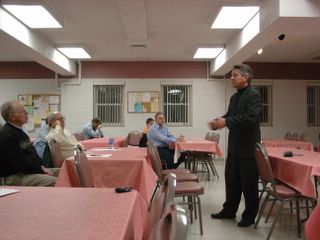This story, an award winner, talks about two areas of South Africa where they installed 150 computer labs with a blend of open source and volunteers.
TECTONIC: Schools Linux project wins award for community building The tuXlabs project was founded by the Shuttleworth Foundation and installs Linux-based PC laboratories into schools in the Western and Eastern Cape and the Limpopo province. The project, which uses volunteers to assist in installing the computers, has installed 150 laboratories in the past two years.This is huge. Furthermore, we are doing nothing. Zippo.
Volunteers that participate in the project are taught how to install, configure and maintain the Linux computer centres. Once they are skilled in the process they in turn teach other volunteers. Learners and teachers at the various schools are also involved in the installation of the computers.
tuXlabs project manager Hilton Theunissen says that what makes this award special, however, is that it is not a technology award. 'We have always said the benefit of open source software is not so much the technology but the opportunities it creates. This award is focused on building capacity, skills and communities. Open source software makes these more accessible.'
A couple of years ago I tried to establish mini computer labs in a few of the recreation centers in the city. I was part of the Pittsburgh Interfaith Impact Network. We had a committee devoted to making a significant change with the youth. We wanted to put in six computer labs. We wanted to have a good core of volunteers for on-going support. The initial hardware was already obtained. Comcast has a contract with the city and the high-speed internet should be in 88 facilities already.
We had a flat-out failure due to the city's unwillingness to embrace technology.
This has to change. This will change as soon as I'm elected to city council.









